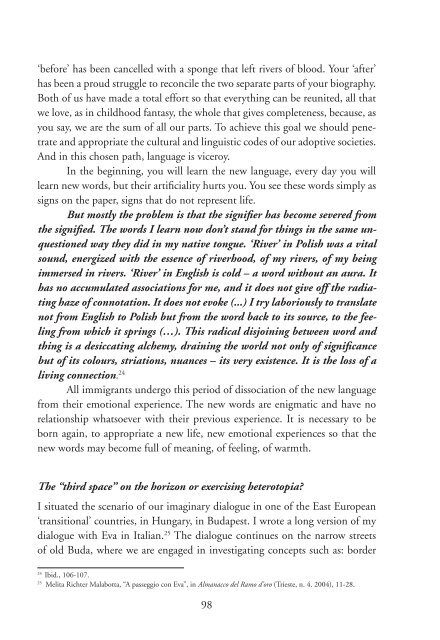Teaching Subjectivity. Travelling Selves for Feminist ... - MailChimp
Teaching Subjectivity. Travelling Selves for Feminist ... - MailChimp
Teaching Subjectivity. Travelling Selves for Feminist ... - MailChimp
You also want an ePaper? Increase the reach of your titles
YUMPU automatically turns print PDFs into web optimized ePapers that Google loves.
‘be<strong>for</strong>e’ has been cancelled with a sponge that left rivers of blood. Your ‘after’<br />
has been a proud struggle to reconcile the two separate parts of your biography.<br />
Both of us have made a total ef<strong>for</strong>t so that everything can be reunited, all that<br />
we love, as in childhood fantasy, the whole that gives completeness, because, as<br />
you say, we are the sum of all our parts. To achieve this goal we should penetrate<br />
and appropriate the cultural and linguistic codes of our adoptive societies.<br />
And in this chosen path, language is viceroy.<br />
In the beginning, you will learn the new language, every day you will<br />
learn new words, but their artificiality hurts you. You see these words simply as<br />
signs on the paper, signs that do not represent life.<br />
But mostly the problem is that the signifier has become severed from<br />
the signified. The words I learn now don’t stand <strong>for</strong> things in the same unquestioned<br />
way they did in my native tongue. ‘River’ in Polish was a vital<br />
sound, energized with the essence of riverhood, of my rivers, of my being<br />
immersed in rivers. ‘River’ in English is cold – a word without an aura. It<br />
has no accumulated associations <strong>for</strong> me, and it does not give off the radiating<br />
haze of connotation. It does not evoke (...) I try laboriously to translate<br />
not from English to Polish but from the word back to its source, to the feeling<br />
from which it springs (…). This radical disjoining between word and<br />
thing is a desiccating alchemy, draining the world not only of significance<br />
but of its colours, striations, nuances – its very existence. It is the loss of a<br />
living connection. 24<br />
All immigrants undergo this period of dissociation of the new language<br />
from their emotional experience. The new words are enigmatic and have no<br />
relationship whatsoever with their previous experience. It is necessary to be<br />
born again, to appropriate a new life, new emotional experiences so that the<br />
new words may become full of meaning, of feeling, of warmth.<br />
The “third space” on the horizon or exercising heterotopia?<br />
I situated the scenario of our imaginary dialogue in one of the East European<br />
‘transitional’ countries, in Hungary, in Budapest. I wrote a long version of my<br />
dialogue with Eva in Italian. 25 The dialogue continues on the narrow streets<br />
of old Buda, where we are engaged in investigating concepts such as: border<br />
24<br />
Ibid., 106-107.<br />
25<br />
Melita Richter Malabotta, “A passeggio con Eva”, in Almanacco del Ramo d’oro (Trieste, n. 4. 2004), 11-28.<br />
98

















